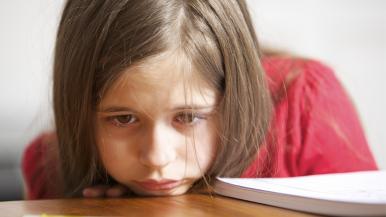Kids today are under more pressure, both academically and socially, than kids were only a few decades ago. They face more competition in school, they have more homework and they start getting assignments at a much younger age. And their after-school and weekend schedules are often just as hectic.
Social situations may also produce stress, such as being teased by a classmate, not being invited to a party or being picked last for a team in gym class.
"Adults and kids perceive stress very differently," says Carrie Drazba, MD, a pediatrician at Rush University Medical Center. "What may seem minor to you may, in a kid's world, be a big stressor."
Those stressors can cause sleep disturbances or even physical symptoms, such as an upset stomach. Kids who are stressed may also "act out" more. "It's their way of telling you that something is on their mind and they want to talk about it, but they don’t know how to verbalize it," Drazba says.
That's why it's important for parents to watch out for signs of stress and to help their kids deal with stressors in a healthy way. Drazba offers the following suggestions for de-stressing your kids:
Make dinner a family affair.
"A lot can be solved over the dinner table," Drazba says. "Sit down with your kids over a good meal, without the TV on, and ask how their day went — what was good, bad, stressful. Then help them work through any problems they have."
Make it a priority to relax and spend quality time with your kids at the end of the day and on weekends. You'll all feel less stressed.
Don't overschedule your kids.
Too many activities and not enough down time? Set limits on the number of classes and days, and stick to them. Leave weekends activity-free as much as possible. Help your kids figure out which extracurricular activities they enjoy most and really want to keep, and which ones they can skip.
One effective strategy: rotate activities. For instance, sign up for soccer in the fall, dance in the winter and karate in the spring instead of scheduling all three at the same time. Switching things up will also help prevent overuse injuries, burnout and boredom.
Don't bring work-related stress home.
Make it a priority to relax and spend quality time with your kids at the end of the day and on weekends. You'll all feel less stressed.
Partner with your pediatrician to combat stress.
If your child does have physical symptoms, such as a stomachache, take him or her to the pediatrician to rule out a medical problem. If the problem is stress-related, the doctor can help you and your child diffuse the stressor.
Stay connected to your kids.
"This is the most important thing parents can do. Pay attention to your kids, talk to them, listen to them," Drazba says. "That's what they truly crave."




